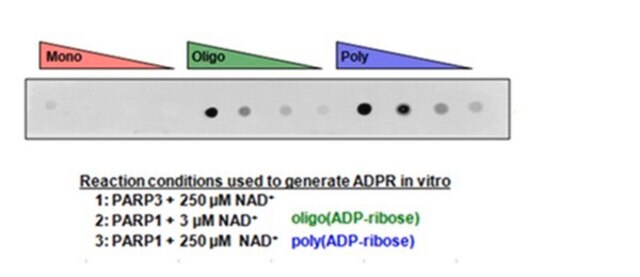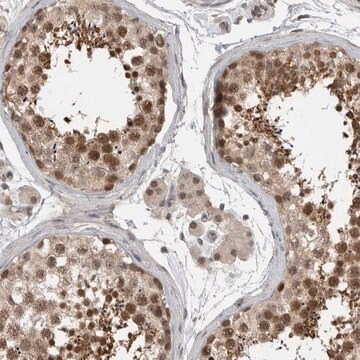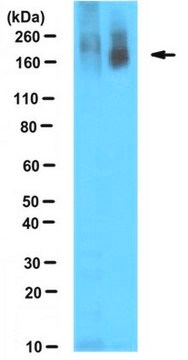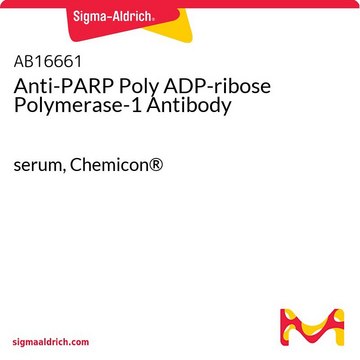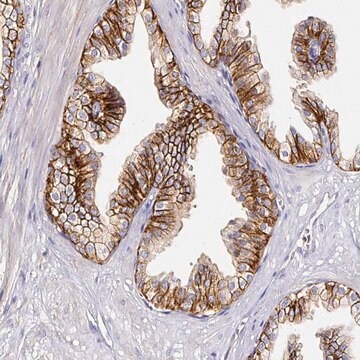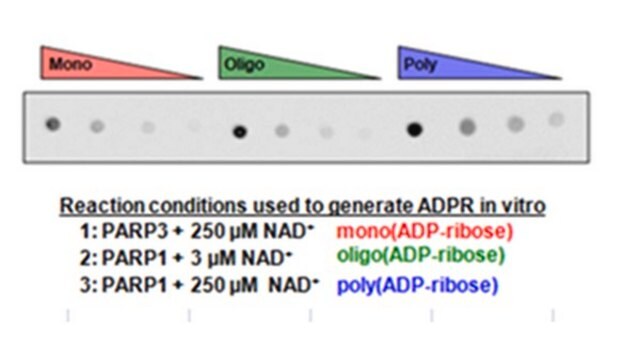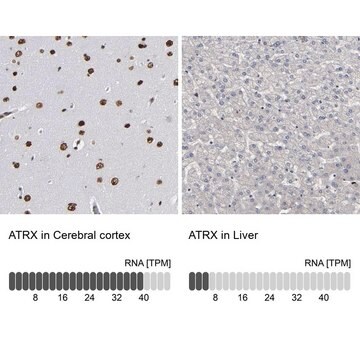ZMS1103
Anti-Poly(ADP-ribose) Antibody, clone 10H ZooMAb® Mouse Monoclonal

recombinant, expressed in HEK 293 cells
Synonim(y):
PAR, Poly (ADP-ribose) polymer
About This Item
Polecane produkty
pochodzenie biologiczne
mouse
Poziom jakości
rekombinowane
expressed in HEK 293 cells
białko sprzężone
unconjugated
forma przeciwciała
purified antibody
rodzaj przeciwciała
primary antibodies
klon
10H, recombinant monoclonal
opis
recombinant, expressed in HEK 293 cells
linia produktu
ZooMAb® learn more
Postać
lyophilized
masa cząsteczkowa
calculated mol wt 559.32 kDa
observed mol wt ~200 kDa
oczyszczone przez
using protein G
reaktywność gatunkowa
human
reaktywność gatunkowa (przewidywana na podstawie homologii)
all
opakowanie
antibody small pack of 25
charakterystyka ekologicznej alternatywy
Waste Prevention
Designing Safer Chemicals
Design for Energy Efficiency
Learn more about the Principles of Green Chemistry.
rozszerzona walidacja
recombinant expression
Learn more about Antibody Enhanced Validation
sustainability
Greener Alternative Product
metody
immunocytochemistry: suitable
immunoprecipitation (IP): suitable
western blot: suitable
izotyp
IgG1κ
kategoria ekologicznej alternatywy
Warunki transportu
ambient
temp. przechowywania
2-8°C
Powiązane kategorie
Opis ogólny
Specyficzność
Immunogen
Zastosowanie
Evaluated by Western Blotting in HeLa cell lysate.
Western Blotting Analysis: A 1:10,000 dilution of this antibody detected Poly(ADP-ribose) in HeLa cell lysate.
Tested Applications
Immunocytochemistry Analysis: A 1:1,000 dilution from a representative lot detected Poly(ADP-ribose) in HeLa treated with 0.1% Hydrogen Peroxide, but not in untreated cells.
Immunoprecipitation Analysis: 2 µg from a representative lot immunoprecipitated Poly(ADP-ribose) in HeLa treated with 0.1% Hydrogen Peroxide.
Note: Actual optimal working dilutions must be determined by end user as specimens, and experimental conditions may vary with the end user.
Opis wartości docelowych
Postać fizyczna
Rekonstytucja
Przechowywanie i stabilność
Informacje prawne
Oświadczenie o zrzeczeniu się odpowiedzialności
Nie możesz znaleźć właściwego produktu?
Wypróbuj nasz Narzędzie selektora produktów.
Kod klasy składowania
11 - Combustible Solids
Klasa zagrożenia wodnego (WGK)
WGK 1
Temperatura zapłonu (°F)
Not applicable
Temperatura zapłonu (°C)
Not applicable
Certyfikaty analizy (CoA)
Poszukaj Certyfikaty analizy (CoA), wpisując numer partii/serii produktów. Numery serii i partii można znaleźć na etykiecie produktu po słowach „seria” lub „partia”.
Masz już ten produkt?
Dokumenty związane z niedawno zakupionymi produktami zostały zamieszczone w Bibliotece dokumentów.
Nasz zespół naukowców ma doświadczenie we wszystkich obszarach badań, w tym w naukach przyrodniczych, materiałoznawstwie, syntezie chemicznej, chromatografii, analityce i wielu innych dziedzinach.
Skontaktuj się z zespołem ds. pomocy technicznej